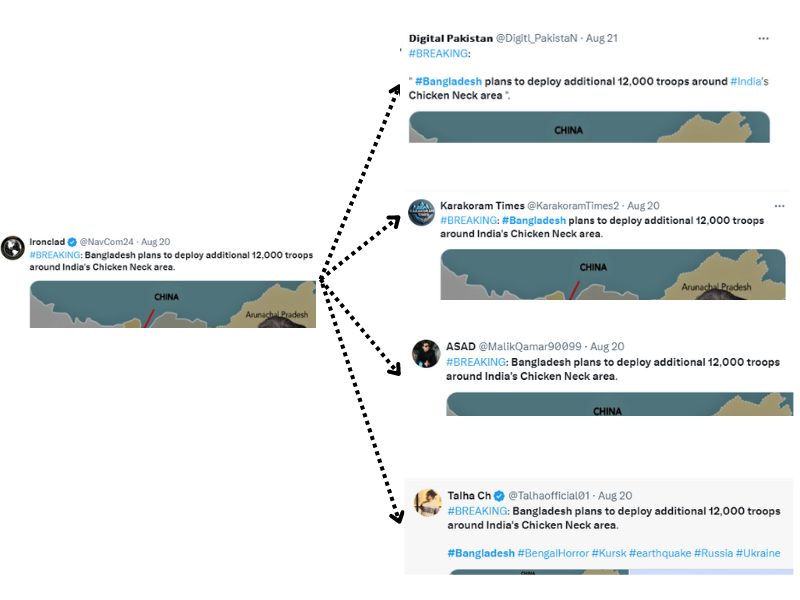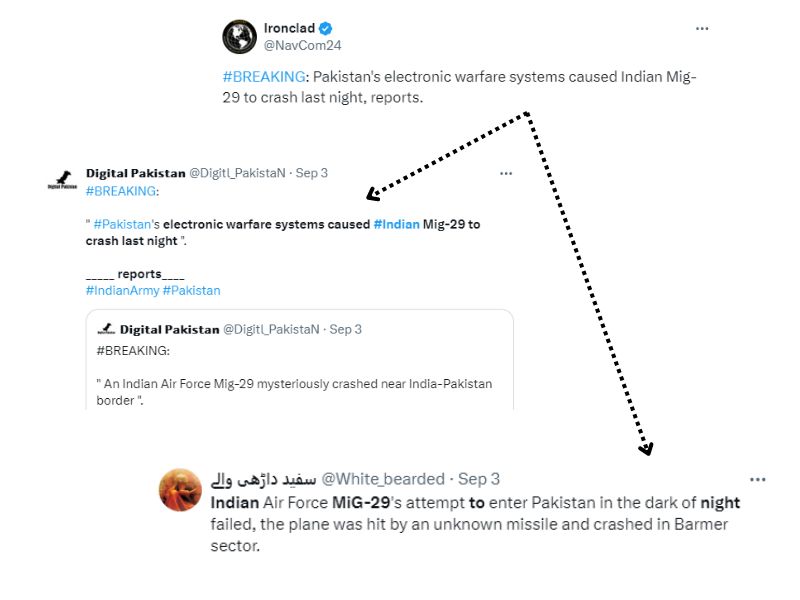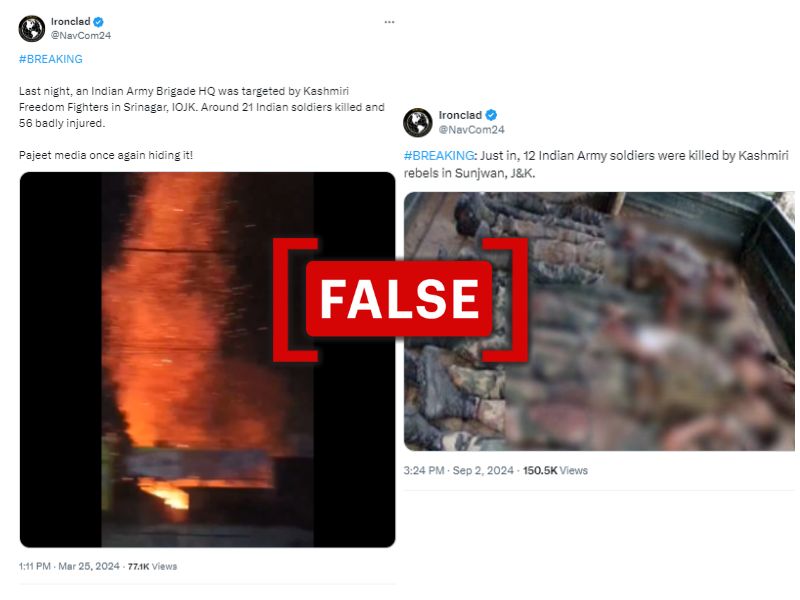By: Anurag Baruah
September 11 2024
.png) The X account 'Ironclad' is at the center of a coordinated anti-India disinformation campaign. (Source: Logically Facts)
The X account 'Ironclad' is at the center of a coordinated anti-India disinformation campaign. (Source: Logically Facts)
Several weeks into Bangladesh beginning its recovery from student protests that culminated into violence, on August 25, a claim appeared on social media that the country had suspended gas supply to India’s 'Seven Sisters' — referring to its northeastern states.
While natural gas has never been exported from Bangladesh to India via pipelines, the claim soon went viral. This was around the time when the situation in Bangladesh was relatively calm, following protests and unrest that led to the resignation of Prime Minister Sheikh Hasina on August 5 and the formation of an interim government on August 8. Hundreds have died in the spate of violence, and Hasina is currently seeking refuge in India since fleeing the country.

A screenshot of a grid view of images used in the dozens of posts in Bengali language that went viral, mostly in Bangladesh. (Source: Screenshot/Facebook/Modified by Logically Facts)
Almost all of the dozens of viral posts in the Bengali language claimed that the news came from a “tweet from India,” and included a screenshot of an X (formerly Twitter) post from an account called ‘Ironclad’ (@NavCom24). At 5:35 p.m on August 25, the account was the first to post that Bangladesh had stopped gas supply to India and was consecutively referenced by other users. The closest replication was the same day at 6:05 p.m. by Talha Ch, a self-proclaimed social media activist and journalist from Pakistan.
A video also went viral showing the purported suspension. This narrative prompted Bangladesh's Ministry of Power, Energy and Mineral Resources to issue a clarification.
Majority of the posts replicating the claim appeared on August 26, all surfacing after the post by ‘Ironclad’, an account suspended in India. It garnered 211,000 views at the time of writing this story and remains the most widely interacted-with post regarding this claim.
An investigation by Logically Facts also found that the X post from ‘Ironclad’ is part of a larger corpus of false narratives that began circulating on social media around the third week of August, projecting the Bangladeshi interim government and the Indian government are at loggerheads over a range of issues varying from floods to gas supply.

Screenshots of X posts resharing posts with different claims from the 'Ironclad' account. (Source: Screenshots/X/Modified by Logically Facts)
Several other posts indicating escalating tension between India and Bangladesh also went viral. For instance, India’s Ministry of External Affairs had to issue a clarification about the false narrative that water released by India had caused the recent Bangladesh floods. Further, we found that the photo, shared along with another narrative that the Indian flag was burnt in Dhaka, was from an unrelated incident in Srinagar, Jammu and Kashmir, in August 2009.
What stood out for us is that the X account ‘Ironclad’ was at the center of a lot of the above-mentioned claims. Multiple X users have directly reshared posts from this account .
The verified account identifies itself as “a running OSINT network reporting on conflicts and strategic developments in South Asian region,” and has nearly 17,000 followers. It was created in September 2023 and claims to be located in Washington, D.C.
 Screenshot of the Ironclad account. (Source: Screenshot/X/Modified by Logically Facts)
Screenshot of the Ironclad account. (Source: Screenshot/X/Modified by Logically Facts)
We went through 508 posts written by the account between September 30, 2023, and September 9, 2024, and found that they can be grouped under a few recurring narratives.
The first post from the ‘Ironclad’ account, dated September 30, 2023, shared an old photo from 2015 as “Pakistani flags again raised in Srinagar.”
 Screenshot of the first post from the Ironclad account. (Source: Screenshot/X/Modified by Logically Facts)
Screenshot of the first post from the Ironclad account. (Source: Screenshot/X/Modified by Logically Facts)
Following this, it has shared various unverified claims about the Indian Air Force and Indian Army, in an attempt to spread disinformation about the Indian security forces.
Projecting disharmony between India and its neighboring countries is another recurring theme. It has also recently shared posts suggesting that Bangladesh, China, and Pakistan are working together, while other posts claimed that Russia is “no longer considering India as a reliable partner.”
Logically Facts reached out to X for comment on suspending ‘Ironclad’ only for Indian users, while allowing it to continue running a disinformation campaign during the Bangladesh crisis. In what has now become a standard reply to all mails sent on its official address, Logically Facts got the response, “Busy now, please check back later.”
A Logically Facts analysis revealed that around ten to 12 self-identified Pakistan-based X accounts copy-pasted and shared multiple claims about Bangladesh-India relations in a coordinated manner; this came within a few hours after they were first posted by ‘Ironclad’.
Copypasta, as this tactic is termed, is a method to propagate a message, and can be used to artificially amplify content; it is also one of the most persistent forms of mis-and disinformation.
For instance, a claim posted by ‘Ironclad’ on July 26 that the “Indian government has asked all NGOs not to send any flood relief aid to Bangladesh,” was replicated by multiple self-proclaimed Pakistan-based accounts within a few hours. One account identified itself as social media incharge of Jamaat-E-Islami, an Islamist political party based in Pakistan.
 Screenshots of multiple Pakistan-based X posts replicating the Ironclad post that made an unverified claim about the Indian government asking all NGOs not to provide relief aid to Bangladesh. (Source: Screenshots/X/Modified by Logically Facts)
Screenshots of multiple Pakistan-based X posts replicating the Ironclad post that made an unverified claim about the Indian government asking all NGOs not to provide relief aid to Bangladesh. (Source: Screenshots/X/Modified by Logically Facts)
Several of these accounts also replicated the claim about the suspension of gas supply. As mentioned before, the account Talha Ch was among them; it has also replicated more posts from ‘Ironclad’.
 Screenshots of multiple Pakistan-based X posts replicating the Ironclad post that falsely claims about Bangladesh suspending gas supply to India. (Source: Screenshots/X/Modified by Logically Facts)
Screenshots of multiple Pakistan-based X posts replicating the Ironclad post that falsely claims about Bangladesh suspending gas supply to India. (Source: Screenshots/X/Modified by Logically Facts)
Accounts like ‘Digital Pakistan’ and ‘Talha Ch’ replicated the claim first posted by the ‘Ironclad’ on August 20 that “Bangladesh plans to deploy additional 12,000 troops around India's Chicken Neck area.” Another account called ‘Karakoram Times’ also did the same.
 Screenshots of multiple Pakistan-based X posts replicating the ‘Ironclad’ post that made an unverified claim about Bangladesh planning to deploy additional 12,000 troops around India's Chicken Neck area. (Source: Screenshots/X/Modified by Logically Facts)
Screenshots of multiple Pakistan-based X posts replicating the ‘Ironclad’ post that made an unverified claim about Bangladesh planning to deploy additional 12,000 troops around India's Chicken Neck area. (Source: Screenshots/X/Modified by Logically Facts)
The same four accounts copied text from another post by ‘Ironclad’ from August 22 that claimed, “Indian flag burned in Dhaka as sudden water release by India causes massive floods in Bangladesh.”
 Screenshots of multiple Pakistan-based X posts replicating the ‘Ironclad’ post that falsely connected an unrelated, old incident of an Indian flag burning with another false claim about “sudden water release by India causing massive floods in Bangladesh.” (Source: Screenshots/X/Modified by Logically Facts)
Screenshots of multiple Pakistan-based X posts replicating the ‘Ironclad’ post that falsely connected an unrelated, old incident of an Indian flag burning with another false claim about “sudden water release by India causing massive floods in Bangladesh.” (Source: Screenshots/X/Modified by Logically Facts)
Experts from the field indicated the possibility of Pakistan’s intelligence agency the Inter-Services Intelligence (ISI), being behind such disinformation campaigns. The recent unrest in Bangladesh made them more effective in a way, according to them.
“Pakistan’s ISI has built up a phenomenal cyber squad to push disinformation. It’s always attacking by trying to cause fractures in Bangladesh and India. There is now a receptive audience for Pakistani accounts pushing Islamic brotherhood and anti-India slogans in Bangladesh,” Chris Blackburn, a political analyst who has worked on South Asia for over two decades and co-founder of Global Friends of Afghanistan, a U.S.-based non-profit, told Logically Facts.
Earlier in 2021, India had dismantled a coordinated Pakistani disinformation campaign when it blocked 20 YouTube channels and two websites for spreading “anti-India propaganda.”
On September 2, a MiG-29 fighter jet crashed near Rajasthan's Barmer which the Indian Air Force said was caused by “a critical technical snag.”
However, immediately after, on September 3, ‘Ironclad’ began making unverified claims about Pakistan's electronic warfare systems being the cause of the crash. This was subsequently picked up by other accounts like ‘Digital Pakistan’; some others went on to make further unverified claims about an unknown missile hitting the MiG-29 fighter.
 Screenshot of X posts showing 'Ironclad' catapulting disinformation that was picked up by multiple other seemingly Pakistan-based accounts in later stages. (Source: Screenshots/X/Modified by Logically Facts)
Screenshot of X posts showing 'Ironclad' catapulting disinformation that was picked up by multiple other seemingly Pakistan-based accounts in later stages. (Source: Screenshots/X/Modified by Logically Facts)
Upon further investigation, we found that ‘Ironclad’ is the source of multiple other false claims about the death of Indian Army soldiers, attacks on Army establishments, or soldiers causing civilian harm.
On September 2, ‘Ironclad’ falsely claimed on X that 12 Indian Army soldiers were killed by Kashmiri rebels in Sunjwan, Jammu and Kashmir, using a photo from a 2016 incident in Manipur. Similarly, it published multiple posts on Kashmir, which were then amplified by similar accounts. On March 25, 2024, the account shared a video unrelated to Kashmir, falsely labeling it as an attack on an Indian Army Headquarters in Srinagar; which spread widely.
 Screenshots of X posts making false claims targeting the Indian Army with Kashmir as the backdrop. (Source: Screenshots/X/Modified by Logically Facts)
Screenshots of X posts making false claims targeting the Indian Army with Kashmir as the backdrop. (Source: Screenshots/X/Modified by Logically Facts)
Similarly unverified claims about Chinese incursions into India originated from ‘Ironclad’ on multiple occasions, and were picked up by the same set of accounts.
We noted that the same account also posted disinformation amid the Manipur conflict alleging a “molestation attempt by Indian Army soldiers leading to death of two soldiers after they were beaten up by some local women” which was debunked as false by fact-checking organizations. It also made false claims about 22 soldiers dying in clashes with insurgents in Manipur using an unverified video. No recent incidents have been reported involving such a large number of Indian army soldier deaths in Manipur. These claims were again picked up by various other accounts, some of which showed bot-like activity in the form of multiple posts with the same text.
 Screenshots of X posts showing posts by Ironclad being picked up by other accounts with some showing bot-like activity. (Source: Screenshots/X/Modified by Logically Facts)
Screenshots of X posts showing posts by Ironclad being picked up by other accounts with some showing bot-like activity. (Source: Screenshots/X/Modified by Logically Facts)
On the disinformation campaign being run against the Indian Army and the involvement of ISI, Mahesh Ramachandran, a cyber security expert and Colonel (Retd) of the Indian Army, told Logically Facts, “It’s a fact, happening and not surprising at all. It's called Psy Warfare and is an integral part of non lethal asymmetric warfare - aimed at subversion and instigation of the locals against the target nation. It's bread & butter for all international agencies. Fortunately we have effective countermeasures against such acts.”
‘Ironclad’ has been running a coordinated disinformation campaign targeting India and its security forces. It is also apparent that despite its suspension, the account has been successful in its efforts to an extent. Posts by the account not only managed to garner high levels of engagement but were also repeatedly replicated by a set of accounts, clearly showing a coordinated attempt to spread disinformation. Further, some of the false narratives originating from ‘Ironclad’ even caused governments to intervene owing to their sensitive nature and high potential of harm, highlighting the seriousness of the issue.
(Edited by Shreyashi Roy and Ilma Hasan.)